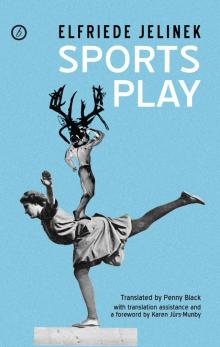- Home
- Elfriede Jelinek
Greed
Greed Read online
Greed
Elfriede Jelinek
Philip Roth says the novel is dead, but it would be more accurate to say the audience is dead – we're all just too polite to mention it. What is killing the novel is people's growing dependence on feel-good fiction, fantasy and non-fiction. With this comes an inability or unwillingness to tolerate any irregularities of form, a prissy quibbling over capital letters, punctiliousness about punctuation. They act like we're still at school! Real writing is not about rules. It's about electrifying prose, it's about play.
For anyone who wants to write or read daredevil, risk-taking prose, therefore, it was tremendously encouraging that Elfriede Jelinek won the Nobel prize for literature in 2004. But most British readers hadn't heard of her, despite four novels being available from Serpent's Tail (Lust, Wonderful, Wonderful Times, Women as Lovers, and The Piano Teacher), all of them full of her uniquely sneering tone and tireless fury with the human race. Jelinek seized the novel by its bootstraps and shook it upside down. Was she looking for coins or keys, or just trying to prevent fiction swallowing any more insincerity? Her dynamic writing gives a sense of civilisation surviving against the odds.
Jelinek's work is brave, adventurous, witty, antagonistic and devastatingly right about the sorriness of human existence, and her contempt is expressed with surprising chirpiness: it's a wild ride. She has also developed a form of cubism, whereby she can approach any subject from any angle, sometimes within the same sentence, homing in with sudden tenacity on some detail such as dirndls or murderers' female pen-pals. Recreating the way the brain lurches along, spreads out, reels itself in or goes on strike, her metaphors and puns run amok, beauteousness sacrificed to a kaleidoscopic inventiveness. Wrongly accused here of writing porn, in America she has been criticised, absurdly, for living with her mother, having a website, and not going along with the war in Iraq. They treat her like some kind of moral philosopher. You can't blame a novelist for being provocative and voicing dissent – that's her job! Without novelists, who's to guide us? Scientists? Priests? Politicians?
The innovation in Greed is that Jelinek intrudes more than ever before, rushing in and out of her own book like someone with tummy trouble. She likes to present herself as the bumbling author: "It's a frequent reproach, that I stand around looking stupid and drop my characters, before I even have them, because to be honest I pretty quickly find them dull." She admits to many mistakes: "Oh dear, that doesn't work, and it's also a repetition. Forgive me, I often can't keep up with myself." She hates naming her characters – "It sounds so silly." She identifies a needy piano teacher as a portrait of herself, then proceeds to ridicule and finally destroy her.
What it amounts to is a dismantling of the novel before our eyes. Greed lacks the focus of Jelinek's previous books, and is nearly incoherent at times. It is a cry of despair – despair about herself as a writer as much as about the characters she invents: "What is so wretched about me, that I can only be used for writing?" These are the exasperated outpourings of a great writer suffering from a lack of recognition (the book was written before Jelinek won the Nobel). There's a bewildered, lonely quality to it, as well as a few too many references to current affairs, and some lazy passages that suggest she no longer believes she has any readers at all – and despite that, some wonderful, defiant mischief-making. She can't go on, she will go on.
The plot, involving the semi-accidental murder of a teenage girl and the dumping of her body in an ominous lake, is minimal and haphazard, its main function to flesh out the divisions between men and women. They are on completely different wavelengths, the women in love with a "country policeman", and he latently in love with men, and blatantly with property. There are other greeds, too, that of banks, naturally, and phone companies, "hot for our voices", and the church. Describing a fancy crucifix, Jelinek writes: "the prominent victim is so full of pride at his stiff price that he's almost bursting out of the screws with which he's fastened to his instrument".
But the country policeman's greed surpasses all. He has prostituted himself to every woman in the vicinity and beyond, in the hope that they will hand over their houses to him, or at least leave him something in their wills. He thinks of female genitalia in the same way, all these doors permanently flung open for him. Jelinek circles round him, disgustedly observing that he "completely lacks a whole dimension, that is… that there are other people apart from himself". "We should all hate corporeal life, but only this country policeman… really does hate it. One just doesn't notice at first, because he sometimes jokes and laughs and sings songs to the accordion."
She is equally scathing about women and their repellent eagerness to be loved. Sex is furtive, violent, base – "you give each other a good licking" – and love merely a common foible which, for women at least, always involves a dangerous loss of selfhood. Jelinek gives us a startling glimpse here of what women are, as well as answering Freud's question, "What do women want?" It's neither gentle nor sweet nor safe nor reasonable – just true.
Carole Angier
***
Greed was published in German in 2000, and thus made part of the oeuvre for which Elfriede Jelinek was awarded the Nobel Prize in 2004. Its plot is soon told. Kurt Janisch, an Austrian country policeman, preys on women. He murders a very young one and drives an elderly one to suicide. This is a long novel, but few of its many pages actually advance the plot. Only now and then, as a sort of concession, will a sentence or two tell us what happens next. Greed might be variously described, but not, I think (pace the blurb), as a thriller.
Mostly, Greed consists of digression, commentary and repetition. A reader interested in story will feel consistently thwarted; perhaps also that such an interest is inappropriate. Serious fiction, you might begin to feel, shouldn't pander to readers wanting to know what happens next.
In German (but not in this translation) the novel has a sub-title: Ein Unterhaltungsroman; that is, light reading, or a novel you might read for fun. This term is at least Jelinek's own, a part of her project and the first note of her characteristic tone of voice, which is sardonic. There are many voices in Greed – the women, Janisch, others in their community – but all sound much the same, infected by the sardonic facetiousness of the author herself; so that, despite its variety of perspective, the tone of the whole is remarkably homogeneous. That tone is a slant expression of outrage, sign of Jelinek's moral seriousness. Her plot and its characters are a canker within the canker of Austria, which may itself be an exemplar of things in general.
Janisch is indeed a nasty piece of work. He has brutal sex with women, hates, fears and despises them; but his greed is really for property. Most readers would, I guess, have been able to develop out of Janisch's character and deeds a critique of the most rapacious and murderous tendencies in modern capitalism; Jelinek does it for them. She is a ranter, and there is much to rant about: polluted lakes, mined-out mountains, tourism, sport, old people's homes, the Nazi past, the fascistic present, the traffic… In the ranting, she resembles her compatriot Thomas Bernhard; but he is, blackly speaking, funnier.
Bernhard's sentences give pleasure. Jelinek seems to want to match the ugliness of her subject with a language that, if not always downright ugly, is never attractive. The sentences are made unshapely by the expanding bulk of ridiculed material. Her book steadfastly prohibits what literary language engenders naturally: pleasure. Her translator aids and abets her in this.
All the author's inventiveness goes into the book's lateral expansion. Her procedures are baroque: a heaping up of instances; frequent allegorising; bizarre conceits. You might even call her whimsical. She devises far-fetched ways of saying a thing, to shock us into awareness with a grisly whimsy.
Greed has considerable energy and force. Its moral urgency is beyond doubt.
But, reading it, you enter a swirling fog of rage, outrage and sardonic contempt that envelops everything, victims and villain alike, the women in their way being as bad as he is: so foolish, so greedy for affection, gobbling him up, no wonder he is fearful. Throughout it all, insistently, comes the author's own voice, sardonic towards herself, doubting her right and ability do what she is doing. This is the stuff of secondary literature: fiction's failure in the face of life. But a persuasive fiction, one in which the author and readers believe, is more powerful, and can do more good, than Jelinek allows herself to suppose.
David Constantine
Elfriede Jelinek
Greed
Translated by Martin Chalmers
The translator wishes to thank Peter " Bar " Gattinger, Esther Kinsky, and Alex Schmidt for making this a better translation than it would otherwise have been.
– M.C.
ONE
Today country policeman Kurt Janisch is once again looking at the photo on which his father, Police-Colonel Janisch, saluted the King, thirty years earlier. Look, his father is still standing there, evidently forced to draw back just an inch from his own enthusiastic motion of standing to attention, but why is there nothing to check him?-there's something soft, indecisive about his shoulders, which then seems to push him forward again. Perhaps it was no more than an involuntary bow before the monarch, more or less as an encore to the frequendy rehearsed salute. There's nothing at all subordinate about the son anymore, standing there in front of the cabinet in his striped track-suit harnessing his body by slowly warming it up before going running. His father had still borne his subordination, with drooping shoulders but capable hands, down the dusty country roads and to smashed up car wrecks. Perhaps the son is more versatile and can also give orders, the way he looks makes me curious: a somewhat angular face, across which the thoughts, which in all people like to spread out, merely seem to shyly slip through. Well. But the will would be there now, what is he going to use it for? The boat has heaved to, the traffic lights are switched on and are permanently at green, the fine distinction between him and other people is growing.
The country policeman is meanwhile completely dominated by a kind of greed, which came unnoticed, but was finally noticeable even to the neighbors (astonishment at plant progeny in the front garden, no one knows where they come from, he can't have bought them!). Occasionally someone looks up the land register, to see what the country policeman tried to camouflage with the book of life. Now he has moored, he has spied out his targets. The oars have been taken in, the line, the nets cast. Perhaps originally there was room for something else, beautiful, decent in the country policeman? A good-looking and seemingly light-hearted man, the country policeman, just the sort we women like. Something to work with. It's not just to keep world peace that men dish out a load of lies to women, to make them dependent, while women indeed have something better to offer, all their thinking and feeling and a lot of things made of brightly colored wools. It's understandable, of course, that we, especially those of us with the older sex organs, who haven't seen much through the little escape hatches of the body, must remain strangers to ourselves nevertheless! We love-hungry ladies, unfortunately we don't know this country policeman (the flower of the country road goes down right in front of his marked car and we're not there) personally. Not to worry, I'll take care of that: So as not to jeopardise your little bit of lover's bliss which depends on deception, like every other kind, I'd better take over the telling of the story myself now. Don't interrupt! At the moment in order to prevent war between the bodies I can't even exactly tell their functions. Not even this determination in the man, which I already sense, properly knows its goal yet, but I know it's been looking for a long time and will find it in what corrupts most easily, the human body. Whoever knows himself will immediately want a bit of the other, but then the others immediately want it, too.
Incidentally they're both dead now, the king and his guide and guard, the father of the country policeman, who that day proudly escorted the prancing black coaches from Graz main station (the state visit came from Vienna by rail over the Semmering Pass) across the foreordained Mur Bridge and then casually flung them into the armory, where already centuries ago rich people had handed over their metal clothes for safekeeping. How can one hate life, the son is just thinking, who was left over from his father's table, and turns his face to the mountain wind. High up there, through the attic window of his house, a small trough for animals can be seen, into which soft muzzles dig, whose owners, male and female, will later be shot, many of them, except for the mothers, which at this time of year are still protected by their motherhood. Others are alone. Even animals, often wrongly, seek out the nearness of the other, and the country policeman also likes to be sociable in the public house and does small deals on the side (with watches and jewelry preferably in the county town! Where not so many people know one's face). Therefore many people regard him as a good mate, who can get you second hand building tools along with building materials more cheaply. Yet if he honestly travels around inside himself, he has to conclude it's so dark in there, one doesn't even know exactly where one is. No wonder that again and again, at intervals of about a month, he has to light himself up a bit through belligerent but not very purposeful indiscriminate drinking. His colleagues don't see this darkness in their chum, perhaps they suspect it sometimes, and they don't want to believe their wives, who sense something like that and are strongly attracted by it until they end up in a heap on heat. Whoever only learns about everything from reading should please do so now.
Am I mistaken, or was something found here years ago that was never cleared up? What am I forced to look at, when I open this old newspaper? A pale face glimmers there beneath the lowest fir twigs, like a little moon, the face has something to tell, but can no longer tell anyone, because a heavy hand was laid on the throat, clothes were pulled down, the features of the face convulsed; tracks which might good-naturedly have given the green light, if only they'd been asked, arched up, broke, as the roots of the body, the legs, were tugged and shaken, until enough was enough, until the crumbly earth was loosened. So, now where's the bag with the humor, which we still had with us when we gave information to the police earlier? Where is the humus for the potting? Jeans into which absolutely nothing seems to fit anymore, come apart at the seams, a skirt flies up, falls down to earth again from heaven, reluctantly, because not cut out for it, becomes a sack, into which goes the woman's face. Well, and now where will we put the stamp, so that this one, originally with such varied interests, will in future only long for sleep, because she has got to know and learned to reject fundamentally, down to the last root fibers of being, the opposite of sleep, extreme activity?
It sometimes makes the country policeman nervous that the villagers don't really know him at all, although the camouflage he originally strove for was kindness and friendliness after all, and then he goes on drinking far too long, alone if need be. The ground beneath and between his feet has already been caressed by women until it got too hot for him, women on whose grounds he has cast an eye. Such a forceful, big man, who is capable of unleashing almost any kind of event. A chosen woman, who previously had been lying a little too long in the shop window, until too many had seen her and not taken her away, meanwhile knows only the square yard in front of the telephone, and it, too, has by now been burnt right through from all the running back and forth, and then the way from the door and the nice bed, which, together with new satin bed linen has been specially bought for two in the county town. What does one need the rest for?
It's not good to hate, but only if you tell me who, can I really say, if it's good or bad. It gives some people the energy they need, like a Mars bar, which comes straight from the god of war and plunges into a human figure, until the latter has melted away. The pilot can no longer save himself even with his ejector seat. But with hating one can grow nice and old. It passes the time, which in any case runs off as soon as it sees us. Of course, everyone th
inks they must be among friends, if they happen to run across someone outwardly tranquil, who holds public office and takes it out of women, they're always really finished afterwards. So why hate, except in a war, which is being of once again at present, which makes everything inside us, and that's a great deal, depending on the anger of the other side, shoot out and could only be dammed up once more by the utmost love of life and a home-sewn iron curtain. But we don't have anything like that in stock in our store, we've only got two very soft down duvets there, in case someone happens to drop by. Instead we have reciprocal campaigns on offer, until the field between us is trampled down. Now it's been softened up as well by the rain and our desires for our neighbor's property. It's no longer good even as a field of slaughter. But the neighbor has to give way anyway, we've threatened to get the police onto him, if he doesn't take down the wall with the ugly fence on top, because it's spoiling our view. Frankness, diligence, and cheerfulness, which the country policeman likes to feign for others, is intended to give rise to the love of others towards him, but there is little of this commodity in stock. The flames are already shooting up in the Game Boy, in which our own life is simulated, but what frightful face is looking back at us from it? No face looks back from us at the country policeman, who is fast asleep with sweet dreams of power and greatness, because, wrongly, this man doesn't interest us yet. That could soon change once he has got hold of the building plan of our circuits and our little house and the apartments we own. I hope I'll manage it so that you too experience one of his happy moments! But I doubt it, I already don't like him. It's a frequent reproach, that I stand around looking stupid and drop my characters before I even have them, because to be honest I pretty quickly find them dull. Perhaps at this very moment, as the servant of the state is bending over someone else's building plan, which he has stolen, perhaps now he is happier than we are? And we're supposed to be interested in that?

 The Piano Teacher
The Piano Teacher Sports Play
Sports Play Lust
Lust Greed
Greed Wonderful Wonderful Times
Wonderful Wonderful Times